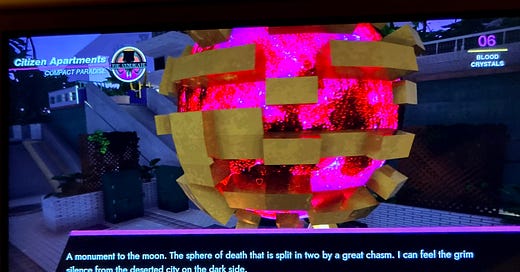Paradise Killer
by Fellow Traveler
Released on Nintendo Switch in September 2020
I don’t let biology hold me back. I take estradiol for femininity. I take dramamine for motion sickness. Both have helped me love video games more.
Depictions of lesbian romance have always resonated with me in a hard-hitting, heart-breaking sort of way. But transitioning took away the sting, because now I could have a lesbian romance of my own. After starting HRT, I was able to see more of myself in queer games like Life Is Strange and Gone Home. The endings of both still devastated me. But I was no longer an outsider looking in. Even if I was decades older than the protagonists, the games welcomed me inside, giving me a glimpse of what I missed as a boy.
Dramamine, of course, keeps me from throwing up—which almost happened several times while playing Paradise Killer before Jess and I wised up. The older I get, the harder it is for me to ride in or even drive a car without getting sick. It’s that conflict between perceived and actual movement, right? After enough tumult in my life, I need some steady ground. If an hour on 95 to my sister’s house is enough to trigger nausea and a migraine, then imagine the damage a flashy first-person game on the Switch Lite’s tiny screen could do.
Still we persisted.
Jess and I play a lot of single-player games together, one of us at the controls, the other watching, chiming in with suggestions of how to solve a puzzle or where to go next. I never feel disengaged when Jess drives, as she did with Paradise Killer, which probably says a lot about the games we choose, which are mostly narrative-heavy, leaning toward walking simulator territory. Paradise Killer was something different for us, with its open world exploration and focus on discrete objectives. But without any real action to speak of, story remained the central focus. I quickly connected with the protagonist, Lady Love Dies, her motivations and suspicions, her curiosity and regrets, her drive to crack the case. I fell in deep.
This game is extremely my shit. How could I not adore something with character names like Crimson Acid and Dr. Doom Jazz; a queer, fat hero; a sleazy 80s-inspired soundtrack; soda machine boons; rococo dialogue from divine moral arbiters; an obtuse, cyclical eschatology revealed in fragments?
But I also loved the ritual Jess and I made of it. After dinner, we’d chew our vomit pills, wait an hour for them to kick in, then sit up in bed and play until we started to nod off. Sometimes Jess would put the Switch down, and we’d talk through the case, debating motives and alibis, me metagaming my theories as always, both sure and so wrong about where the story was going.
We can’t divorce games from the context in which they’re played. I know I would have enjoyed Paradise Killer had I flown solo. It’s aesthetically striking and willfully weird and somehow pulls off every fucked-up choice it makes. But I liked sharing that weirdness with my partner just as much. I liked texting screenshots of bizarre story beats to friends, reading aloud bits of dialogue when Christina came downstairs in the evenings.
It’s fascinating to now think of video games as this inherently social medium, when most of my life I’ve played them to stave off loneliness and depression, when I had little will or reason to leave the house. But I guess it’s like any other art form: they give you something to talk about. They connect you to the world. They give you something to share.













Share this post